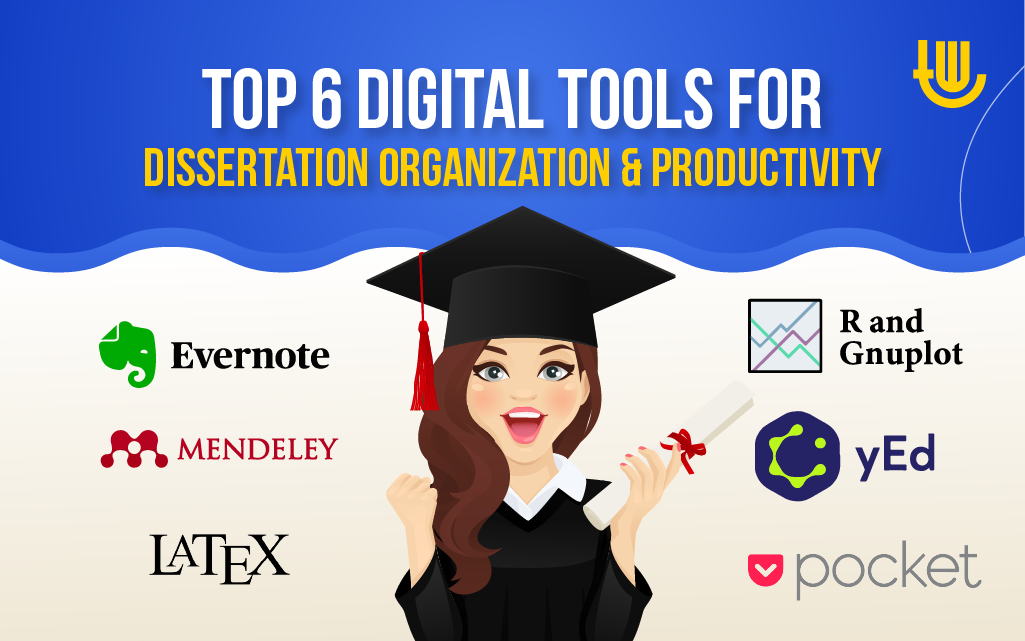Completing a Ph.D. dissertation takes a lot of hard work, time, and commitment; you need all the help you can get. Thanks to technological advancements, there are digital tools that can improve your productivity in your dissertation.
These tools help you take control of your research while ensuring you still have time for yourself.
Furthermore, you can employ professional editing services to finetune your paper after writing. Without further ado, here are the top digital tools to help you organize your dissertation and achieve greater productivity.

For Note Taking: Evernote
As a researcher or PhD student, you will need to make a lot of notes in your research. You will undoubtedly have epiphanies of ideas and thoughts as you read papers and scholarly articles.
To avoid forgetting and losing these ideas, you must note them down; you can do this manually or digitally. One excellent digital note-taking tool is Evernote, a popular and flexible software program.
Creating notes with links, lists, and images with Evernote is easy. Also, the software synchronizes your data across connected devices so that you can easily find your notes with a simple Google search. You can also use this software to create a To-Do list, although Trello or Asana might be better suited.
For Managing References: Mendeley
Referencing is vital to a dissertation; without it, your paper would be considered plagiarized. Unfortunately, considering the depth of research conducted for dissertations, the number of references you deal with can be huge.
Luckily, there are also digital tools to make the work easier and faster; Mendeley is a very good tool in this aspect. With this tool, you don’t have to manually (and painfully) scan through folders looking for papers you downloaded.
Mendeley is a free and intuitive reference manager that helps you arrange your bibliography in the perfect order. You can also get browser plugins with the tool to add PDF references easily.
Furthermore, with Mendeley, you can automatically generate reference lists when or after writing your dissertation. Moreover, Mendeley can help you find papers relevant to your topic, which means less referencing time.
For Typing: Latex
Dissertations are typically longer than academic papers like undergraduate and Master’s thesis. That means you can expect to fill at least 100 pages with valuable information you gathered from your research.
Latex is a very good and helpful digital tool that can help with your scientific writing as a PhD student. The software is high-quality and the de facto standard for publishing scientific papers.
While Microsoft Word is a great writing tool, you need an equally complex tool for writing as complex as a dissertation. Latex is much better; you’ll find it faster and easier to use once you get a good grip.
For Data Analysis and Plotting: R and Gnuplot
You will obtain data from your research, which you must analyze, present, and interpret in your dissertation. R is an excellent tool for analyzing data for your dissertation – and it is free.
R is a programming language used for different types of visualization projects, statistics, and data science. While R software can be difficult to learn, once you do, you’ll be glad you did.
Moreover, there are many free tutorial videos online, including on YouTube, where you can learn R more easily. Gnuplot is another good tool for analysis and plotting; it is free and a little hard to learn. However, like R, once you learn Gnuplot, you can produce amazing plots for your paper.
For Creating Figures: yED
Your dissertation will naturally feature figures and diagrams, which can be hard to construct and integrate with basic tools. For your work to appear professional, you don’t want to hand-draw diagrams and scan them into your paper. Not when numerous image creation software programs will produce the diagrams for you in seconds. yED is an excellent, simple, powerful, and highly intuitive tool for creating decent figures quickly.
For Managing Distractions: Pocket
As you research and read, you’ll most likely open endless browser tabs on your PC. While this is necessary to ensure you don’t lose an important source, it can make your work harder to navigate.
With the Pocket software, you can bid farewell to the many open web pages making your laptop hang. Pocket is an intuitive software program that stores and catalogs the papers you intend to read for your dissertation.
Pocket is a good digital tool that helps you organize your workload, making the dissertation writing process more productive. It keeps your workspace focused and clean, helping you focus on what’s important.
Conclusion
Your research and dissertation writing process doesn’t have to be burdensome; you just need the tools in your arsenal.
These six digital tools will make researching and writing your dissertation paper much easier and faster. As a result, you can finish your work on time and have time for other essential things.